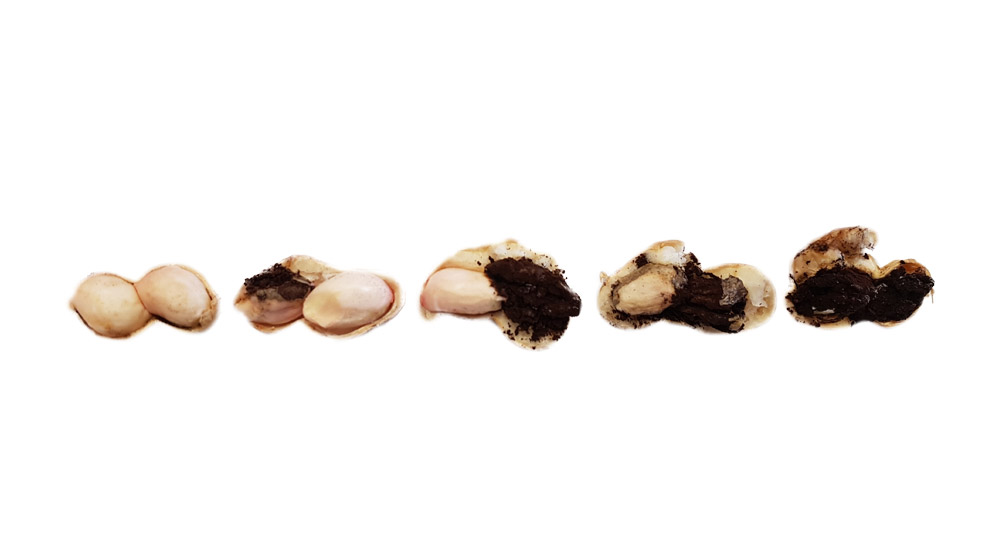With more than 800 thousand tones sold abroad each year, Argentina is one of the leading exporters of peanuts in the world. However, the local production has been affected by smut, a disease caused by fungi Thecaphora frezii, which destroys the seeds of the fruits.
To provide a solution to this problem that leads to a loss of almost 40% of plantations, CONICET researchers participate in projects that aim to develop peanut resistant to smut. For this reason, they identified sources of resistance in wild species of Arachis as well as in old breeds and developed hybrids compatible with the varieties cultivated extensively for the industry.
The research work was jointly conducted with ‘El Carmen Hatchery’, the Universidad Nacional de Río Cuarto, the Universidad Nacional de Córdoba, the Universidad Nacional del Nordeste and the National Peanut Research Laboratory (NPRL). The journals that published it were CropScience and PlosOne. Considering the development of these materials, the researchers estimate that in a few years there will be diverse commercial varieties of peanuts resistant to smut, what will recover the average performance of the peanut crop in Argentina.
“Smut is an endemic disease of Argentina that causes a loss of 40% in the production. For this reason, it is important to work on the solution to this problem. It is hard to find foreign researchers interested in this subject because they do not have it,” says one of the authors of the study, CONICET principal researcher at the Instituto de Botánica del Nordeste (IBONE, CONICET – UNNE), Guillermo Seijo.
“Our contribution was to systematize the existing knowledge of the preliminary tests of peanut breed resistant to smut, which were obtained by the El Carmen through different improvement methodologies. Particularly, we used genetic tools to identify the sources of the resistance and the available resources in old breeds and in wild species to obtain it”, explains Francisco de Blas, Ph.D. fellow of CONICET at the Instituto Multidisciplinario de Biología Vegetal (IMBIV, CONICET – UNC).
One of the tasks was to obtain a ‘three-hybrid’ from the wild species Arachis correntina, Arachis cardenasii and Arachis batizocoi, whose chromosomes were duplicated to be compatible with the commercial variety Arachis hypogaea. In the second one, the resistance was transferred from old peanut breeds of South America. In both cases, scientists developed populations to study the genetic structure of the character and enable the development of genetic markers linked to resistance.
The study aims at expanding the existing variability in commercial varieties through the development of pre-improvement materials, which still present character of wild species or old breeds that have no value for the industry. These materials have already been incorporated into the breeding programs that seek to develop commercial varieties resistant to smut in the short term.
“We have managed to transfer the resistance of these materials, which behave as resistant, to segregating populations for generic and genomic studies of character,” de Blas says. Now, the researchers work to determine which portions of the genome are linked to resistance. For the researchers, in the near future, it will be possible to identify the genomic regions associated with resistance and develop DNA markers to accelerate the programs to obtain resistant commercial varieties.
Although the way to obtain commercial peanut resistant to smut is quite advanced, the main objective of CONICET scientists is to determine the genetic structure of resistance and have the tools to accelerate the process of generating new varieties with better characteristics. “To achieve this, the collaboration between scientific institutions and the productive sector is vital. In this project, our relationship with ‘El Carmen Hatchery’ was essential and we hope to continue obtaining good results from this interaction,” de Blas concludes.
References
de Blas, F. J., Bressanoc, M., Teichd I., Balzarinie, M., Ariasf, R.S., Manifestog, M.M., et al. (2019) Identification of Smut Resistance in Wild Arachis Species and its Introgression into Peanut Elite Lines. Crop Science Vol. 59 No. 4, p. 1657-1665. http://dx.doi.org/10.2135/cropsci2018.10.0656
Bressano, M., Massa, A.N., Arias, R.S., de Blas, F., Oddino, C., Faustinelli, P.C., et al. (2019) Introgression of peanut smut resistance from landraces to elite peanut cultivars (Arachis hypogaea L.). PLoS ONE 14(2): e0211920. https://doi.org/10.1371/journal.pone.0211920
This article was originally published in CONICET
